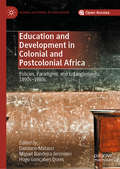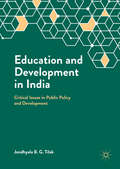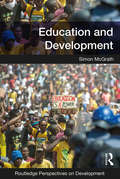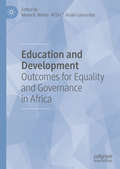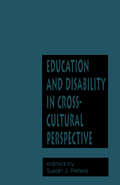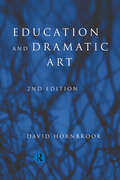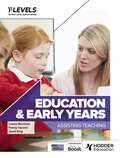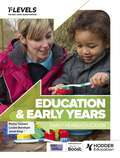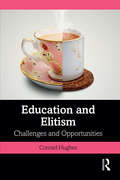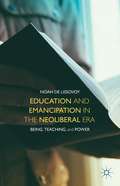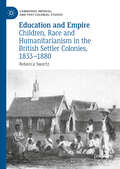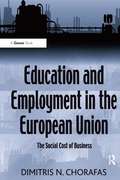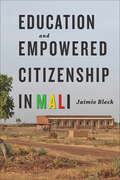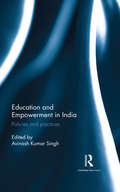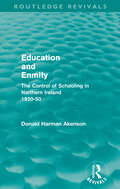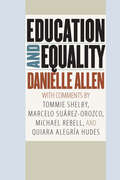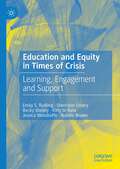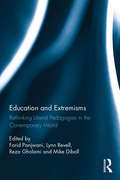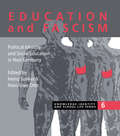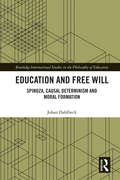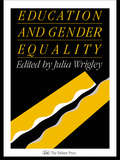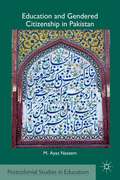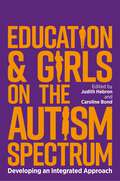- Table View
- List View
Education and Development in Colonial and Postcolonial Africa: Policies, Paradigms, and Entanglements, 1890s–1980s (Global Histories of Education)
by Miguel Bandeira Jerónimo Damiano Matasci Hugo Gonçalves DoresThis open access edited volume offers an analysis of the entangled histories of education and development in twentieth-century Africa. It deals with the plurality of actors that competed and collaborated to formulate educational and developmental paradigms and projects: debating their utility and purpose, pondering their necessity and risk, and evaluating their intended and unintended consequences in colonial and postcolonial moments. Since the late nineteenth century, the “educability” of the native was the subject of several debates and experiments: numerous voices, arguments, and agendas emerged, involving multiple institutions and experts, governmental and non-governmental, religious and laic, operating from the corridors of international organizations to the towns and rural villages of Africa. This plurality of expressions of political, social, cultural, and economic imagination of education and development is at the core of this collective work.
Education and Development in India: Critical Issues In Public Policy And Development
by Jandhyala B.G. TilakDrawing on empirical, interdisciplinary research, this book presents a critical review of some of the major issues that are of interest to researchers, policymakers and planners in developing as well as advanced countries, including specifically in India. It provides an in-depth review of some of the major development policy issues in education in general, and in India in particular, over the past 2-3 decades. Besides presenting an overview of the educational developments in India that reflects issues such as growth, equity, efficiency, foreign aid, decentralization, center-state relations, financing, and cost recovery, the book puts forward in-depth analyses of education poverty, interrelations between education and poverty, low level of outcomes in elementary education, effects of structural adjustment policies and approaches on education, south-south cooperation, etc. It also critically discusses changes in policies relating to financing higher education, external assistance for education, and how the growth of private higher education is affecting society at large. The dichotomy between public policy and action is also highlighted in many chapters. On the whole, while the importance of education is being increasingly recognized, the state does not seem to be as willing to foot the bill for education as the households and even the private sector. Occasionally contrasting with international evidence on, for example, financing higher education, private higher education, or the effects of neo-liberal policies, the book offers an interesting read for a wider audience.
Education and Development: Education, Training And Development In Africa (Routledge Perspectives on Development)
by Simon McGrathThis title explores the place of education in development debates and provides a systematic as well as a theoretical overview of the main approaches to education and development. It emphasises the fact that education is profoundly shaped by national and local cultures even if many issues are shared across institutions in different locations. Education and Development discusses different theoretical accounts from different disciplinary traditions to help students understand the complexity of the overall debate. The text does not shy away from discussions of education’s negative impacts, and insists that an account of education must include consideration of early childhood development, adult, vocational and higher education, as well as the growing range of informal and distance forms. It includes chapters on human capital, human rights and human development, and on education, gender and development, and draws on examples from a wide range of countries and regions such as India, Hong Kong, Kenya and South Africa. The book has a well-developed pedagogy including text boxes, chapter summaries, key questions, links to websites and videos, and annotated further reading sections. Particular attention is paid to ensuring that a plurality of voices, contexts and educational sub-sectors are represented in the boxes, weblinks and references. Education and Development provides an introductory overview to the field, aimed at the undergraduate level, while critically engaging with key themes and questions. The book will also be of interest to development practitioners, policymakers, entrepreneurs and corporate employees engaged in aspects of education and development work.
Education and Development: Outcomes for Equality and Governance in Africa
by N’Dri T. Assié-Lumumba Muna B. NduloThis edited volume addresses a critical aspect of development in Africa: the intersection between education and governance. Using case studies and experiences from different parts of the continent, this book assesses how the potential for human resources, in terms of education, can be leveraged in the development process to achieve equity, inclusive development and governance outcomes in Africa. This book builds on the "resource curse" to focus on human resources as an alternative paradigm to sustainable development in Africa. At a time when concerns over access to quality education is an important issue among policy makers and international development agents, this timely project calls attention to one of the most critical aspects of development in Africa.
Education and Disability in Cross-Cultural Perspective (Reference Books in International Education)
by Susan J. PetersFirst Published in 1993. Routledge is an imprint of Taylor & Francis, an informa company.
Education and Dramatic Art
by David HornbrookTo this day, Education and Dramatic Art remains the only fully worked critique of drama education in schools. Provocative and iconoclastic, this new edition brings the argument up-to-date and locates the author's proposals for a curriculum based on the making, performing and appraisal of dramas securely in the evolving culture of schools. The first section of the book traces the origins and fortunes of drama in schools in the context of changing political times and argues that by neglecting the customs and practices of the theatre, drama-in-education has often kept from the students it professes to empower, the very knowledge and understanding necessary for them to take command of their subject. Part two examines the developmental and pedagogic claims of drama-in-education. Theories of knowledge and meaning and assumptions about schools drama's power to establish a moral and social agenda, are all called to account. Finally, Education and Dramatic Art proposes a multiculturally-based, theoretical structure for the teaching of drama which pulls the theatre and the classroom together and offers teachers the foundation for a broad and balanced drama curriculum with its own distinctive body of knowledge and skills.
Education and Early Years T Level: Assisting Teaching
by Penny Tassoni Louise Burnham Janet KingBegin your path to a career in Education and Early Years with this T Level textbook that covers both the core content and the assisting teaching specialism content you will need to understand to be successful in your qualification. For first teaching from September 2023.Develop your understanding of the key principles, concepts, theories and skills that will give you a solid foundation of knowledge to support you during your industry placement.Created in partnership with NCFE and written by highly respected authors Penny Tassoni, Louise Burnham and Janet King, you can feel confident relying on the insights and experience of these experts.- Track and consolidate your learning using the learning outcomes at the beginning of every unit and Test Yourself questions throughout each unit- Ensure you don't miss any important terminology with key terms highlighted and defined in context- Contextualise your learning with case studies, reflection tasks and practice points- Prepare for your examinations with knowledge-based practice questions- Understand how to approach your assignments with practical tasks and model answers
Education and Early Years T Level: Assisting Teaching
by Penny Tassoni Louise Burnham Janet KingBegin your path to a career in Education and Early Years with this T Level textbook that covers both the core content and the assisting teaching specialism content you will need to understand to be successful in your qualification. For first teaching from September 2023.Develop your understanding of the key principles, concepts, theories and skills that will give you a solid foundation of knowledge to support you during your industry placement.Created in partnership with NCFE and written by highly respected authors Penny Tassoni, Louise Burnham and Janet King, you can feel confident relying on the insights and experience of these experts.- Track and consolidate your learning using the learning outcomes at the beginning of every unit and Test Yourself questions throughout each unit- Ensure you don't miss any important terminology with key terms highlighted and defined in context- Contextualise your learning with case studies, reflection tasks and practice points- Prepare for your examinations with knowledge-based practice questions- Understand how to approach your assignments with practical tasks and model answers
Education and Early Years T Level: Early Years Educator
by Penny Tassoni Louise Burnham Janet KingBegin your path to a career in Education and Early Years with this T Level textbook that covers both the core content and the early years educator specialism content you will need to understand to be successful in your qualification. For first teaching from September 2023.Develop your understanding of the key principles, concepts, theories and skills that will give you a solid foundation of knowledge to support you during your industry placement.Created in partnership with NCFE and written by highly respected authors Penny Tassoni, Louise Burnham and Janet King, you can feel confident relying on the insights and experience of these experts.- Track and consolidate your learning using the learning outcomes at the beginning of every unit and Test Yourself questions throughout each unit- Ensure you don't miss any important terminology with key terms highlighted and defined in context- Contextualise your learning with case studies, reflection tasks and practice points- Prepare for your examinations with knowledge-based practice questions- Understand how to approach your assignments with practical tasks and model answers
Education and Early Years T Level: Early Years Educator
by Penny Tassoni Louise Burnham Janet KingBegin your path to a career in Education and Early Years with this T Level textbook that covers both the core content and the early years educator specialism content you will need to understand to be successful in your qualification. For first teaching from September 2023.Develop your understanding of the key principles, concepts, theories and skills that will give you a solid foundation of knowledge to support you during your industry placement.Created in partnership with NCFE and written by highly respected authors Penny Tassoni, Louise Burnham and Janet King, you can feel confident relying on the insights and experience of these experts.- Track and consolidate your learning using the learning outcomes at the beginning of every unit and Test Yourself questions throughout each unit- Ensure you don't miss any important terminology with key terms highlighted and defined in context- Contextualise your learning with case studies, reflection tasks and practice points- Prepare for your examinations with knowledge-based practice questions- Understand how to approach your assignments with practical tasks and model answers
Education and Elitism: Challenges and Opportunities
by Conrad HughesEducation and Elitism discusses polemical debates around privilege, private schools, elitist universities, equal access to education and underlying notions of fairness. The overarching question that runs through the book is about the future of education worldwide: how can schools and universities tread the tightrope between access and quality? This book investigates the philosophical positions that characterize elitism and anti-elitism to establish three types: meritocratic, plutocratic and cultural. These types of elitism (and their counter-positions) are used as reference points throughout the book's analysis of successive educational themes. The conclusion leads to suggestions that bridge the worlds of elitism and egalitarianism worldwide. The book covers critical questions related to the sociology and philosophy of education with particular focus on contemporary disruptors to education such as the COVID-19 pandemic and protest movements for social justice. With an attempt to offer readers an objective overview, this book will be an excellent compendium for students, academics, and researchers of the sociology of education, education policy and comparative education. It will also be of interest toschool leaders, university provosts and professionals working in curriculum design.
Education and Emancipation in the Neoliberal Era
by Noah De LissovoyThis book describes how neoliberalism as societal philosophy works to limit human potential in our school systems. Analyzing contemporary school reform and control, punishment, and pathologization in schools, this book outlines a theory of emancipation and a process by which pedagogy can build solidarity in classrooms and society more broadly.
Education and Empire: Children, Race, and Humanitarianism in the British Settler Colonies, 1833-1880 (Cambridge Imperial and Post-Colonial Studies Ser.)
by Rebecca SwartzThis book tracks the changes in government involvement in Indigneous children’s education over the nineteenth century, drawing on case studies from the Caribbean, Australia and South Africa. Schools were pivotal in the production and reproduction of racial difference in the colonies of settlement. Between 1833 and 1880, there were remarkable changes in thinking about education in Britain and the Empire with it increasingly seen as a government responsibility. At the same time, children’s needs came to be seen as different to those of their parents, and childhood was approached as a time to make interventions into Indigenous people’s lives. This period also saw shifts in thinking about race. Members of the public, researchers, missionaries and governments discussed the function of education, considering whether it could be used to further humanitarian or settler colonial aims. Underlying these questions were anxieties regarding the status of Indigenous people in newly colonised territories: the successful education of their children could show their potential for equality.
Education and Employment in the European Union: The Social Cost of Business
by Dimitris N. ChorafasEducation, employment policy, and pensions are inextricably linked and critical to any sort of business or economic revival, let alone success, and all three are addressed in Education and Employment in the European Union. In the first part of this meticulously researched and highly informative book, Dimitris Chorafas argues that European educational standards, from primary schools through to universities, leave much to be desired. The author then turns to employment. Already affected by problems with education, employment is fettered by structural issues, ranging from inflexible labour laws to heavy social costs. Here, the author suggests what might be done to get employment moving again in difficult economic times. Employment and pensions work in synergy. In the final part, Chorafas examines the implications of and future for pension provision, taking a polyvalent approach which embraces state pensions, company pensions and the workings of pension funds - as well as healthcare issues and the longevity risk. The evidenced analysis of the three interlinked policy areas in this book identifies the issues and the relationships between them. The findings and suggestions will be important to business practitioners, business educators, government authorities, policy makers, consultancies and others either within or wishing to learn lessons from the European Union.
Education and Empowered Citizenship in Mali
by Jaimie BleckExplores the connections between access to education and political engagement in Mali.Primary school enrollment has nearly tripled in Mali since 1991, when the country made its first transition to multiparty democracy. Jaimie Bleck explores the effect of this expanded access to education by analyzing the relationship between parents’ and students’ respective experiences with schooling and their current participation in politics. In a nation characterized both by the declining quality of public education and by a growing number of accredited private providers, does education contribute substantially to the political knowledge and participation of its citizens? Are all educational institutions (public and private, Islamic and secular) equally capable of shaping democratic citizens?Education and Empowered Citizenship in Mali is informed by Bleck’s original survey of one thousand citizens, which she conducted in Mali before the 2012 coup d’état, along with exit polls and interviews with parents, students, and educators. Her results demonstrate conclusively that education of any type plays an important role in empowering citizens as democratic agents. Simply put, students know more about politics than peers who have not attended school. Education also appears to bolster participation of parents. Bleck finds that parents who send their children to public school are more likely to engage in electoral politics than other Malian citizens. Furthermore, Bleck demonstrates that increasing levels of education are associated with increases in more engaged forms of political participation, including campaigning, willingness to run for office, and contacting government officials.
Education and Empowerment in India: Policies and practices
by Avinash Kumar SinghThis book explores the critical linkages between education and empowerment of women, marginalized groups and other disadvantaged sections of society. It: Provides an overview of educational policies and practices from India’s independence to the present day, and tracks relevant changes and amendments. Examines a range of issues connected with education such as the Right to Education Act; empowerment and community mobilization; higher education challenges and other emerging topics. Brings together both theoretical postulates and empirical findings.
Education and Enmity: The Control of Schooling in Northern Ireland 1920-50 (Routledge Revivals)
by Donald AkensonFirst published in 1973 Professor Akenson’s book traces the series of religious and political controversies which have battered the state schools of Northern Ireland. After the government’s admirably intentioned, but muddled, attempt to create a non-sectarian school system in the early 1920s, the educational system was progressively manipulated by sectarianism. The way in which the author describes how children are schooled reveals a great deal about the attitudes and values of the parental generation and also helps to explain the actions of later generations.
Education and Equality
by Danielle AllenAmerican education as we know it today--guaranteed by the state to serve every child in the country--is still less than a hundred years old. It's no wonder we haven't agreed yet as to exactly what role education should play in our society. In these Tanner Lectures, Danielle Allen brings us much closer, examining the ideological impasse between vocational and humanistic approaches that has plagued educational discourse, offering a compelling proposal to finally resolve the dispute. Allen argues that education plays a crucial role in the cultivation of political and social equality and economic fairness, but that we have lost sight of exactly what that role is and should be. Drawing on thinkers such as John Rawls and Hannah Arendt, she sketches out a humanistic baseline that re-links education to equality, showing how doing so can help us reframe policy questions. From there, she turns to civic education, showing that we must reorient education's trajectory toward readying students for lives as democratic citizens. Deepened by commentaries from leading thinkers Tommie Shelby, Marcelo Suárez-Orozco, Michael Rebell, and Quiara Alegría Hudes that touch on issues ranging from globalization to law to linguistic empowerment, this book offers a critical clarification of just how important education is to democratic life, as well as a stirring defense of the humanities.
Education and Equity in Times of Crisis: Learning, Engagement and Support
by Natalie Brown Sherridan Emery Kitty te Riele Becky Shelley Emily S. Rudling Jessica WoodroffeThis book examines how educational equity is affected during crises – specifically the COVID-19 pandemic. Three key concerns emerge for children’s and young people’s education: material needs, emotional wellbeing, and access to learning. The evidence highlights how pre-existing educational inequalities were exacerbated as well as altered during the global pandemic. Critical reviews of educational vulnerability and of significant crises over the past century provide the book’s foundation. Then, drawing on empirical research from Australia and extensive analysis of international documentation, the book demonstrates significant detriments that pandemic responses caused to formal learning and the broader support role of schools and also addresses promising educational innovations. The book is important not only for scholars in education, but also for practitioners and governments to inform how to better support learning as well as material and emotional wellbeing during and after crises, especially for children and young people experiencing disadvantage.
Education and Extremisms: Rethinking Liberal Pedagogies in the Contemporary World
by Lynn Revell Farid Panjwani Reza Gholami Mike DibollEducation and Extremisms addresses one of the most pressing questions facing societies today: how is education to respond to the challenge of extremism? It argues that the implementation of new teaching techniques, curricular reforms or top-down changes to education policy alone cannot solve the problem of extremism in educational establishments across the world. Instead, the authors of this thought-provoking volume argue that there is a need for those concerned with radicalisation to reconsider the relationship between instrumentalist ideologies shaping education and the multiple forms of extremisms that exist. Beginning with a detailed discussion of the complicated and contested nature of different forms of extremism, including extremism of both a religious and secular nature, the authors show that common assumptions in contemporary discourses on education and extremism are problematic. Chapters in the book provide a careful selection of pertinent and topical case studies, policy analysis and insightful critique of extremist discourses. Taken together, the chapters in the book make a powerful case for re-engaging with liberal education in order to foster values of individual and social enrichment, intellectual freedom, criticality, open-mindedness, flexibility and reflection as antidotes to extremist ideologies. Recognising recent criticisms of liberalism and liberal education, the authors argue for a new understanding of liberal education that is suitable for multicultural societies in a rapidly globalising world. This book is essential reading for academics, researchers and postgraduate students with an interest in religion, citizenship education, liberalism, secularism, counter-terrorism, social policy, Muslim education, youth studies and extremism. It is also relevant to teacher educators, teachers and policymakers.
Education and Fascism: Political Formation and Social Education in German National Socialism (Knowledge, Identity And School Life Ser. #No. 6)
by Heinz Sünker and Hans-Uwe OttoThis text sets out to challenge the reader by posing the question: can we learn from history? More particularly, can we learn from social history and the effects on people living today after National Socialism - the German form of fascism?; Of crucial significance, the authors show how social education in all areas of national socialist society operated and how it functioned in terms of an interest in political formation and social discipline. What is clear is an attempt at complete social control, an unceasing incorporation of the whole lives of all people. At the centre of all these practices stood a process that was meant to lead to a particular formation of identity and ideology. The success of National Socialism in achieving its objectives must today cause us to investigate the relationship between identity and formation, political culture and pedagogic activity.
Education and Free Will: Spinoza, Causal Determinism and Moral Formation (Routledge International Studies in the Philosophy of Education)
by Johan DahlbeckEducation and Free Will critically assesses and makes use of Spinoza’s insights on human freedom to construe an account of education that is compatible with causal determinism without sacrificing the educational goal of increasing students’ autonomy and self-determination. Offering a thorough investigation into the philosophical position of causal determinism, Dahlbeck discusses Spinoza’s view of self-determination and presents his own suggestions for an education for autonomy from a causal determinist point of view. The book begins by outlining the free will problem in education, before expanding on a philosophical understanding of autonomy and how it is seen as an educational ideal. It considers Spinoza’s determinism and discusses his denial of moral responsibility. Later chapters consider the relationship between causal determinism and autonomy, the educational implications of understanding free will and how free will can be utilised as a valuable fiction in education. This book will be of great interest to academics and postgraduate students in the field of education, especially those with an interest in moral education and philosophy of education. It will also be of interest to those in the fields of philosophy and psychology and specifically those focusing on the free will problem, on Spinoza studies, and on the relation between moral psychology and external influence.
Education and Gender Equality
by Julia Wrigley University of CaliforniaFirst Published in 1992. Routledge is an imprint of Taylor & Francis, an informa company.
Education and Gendered Citizenship in Pakistan
by M. Ayaz NaseemThis book challenges the uncritical use of the long held dictum of the development discourse that education empowers women. Situated in the post-structuralist feminist position it argues that in its current state the educational discourse in Pakistan actually disempowers women.
Education and Girls on the Autism Spectrum: Developing an Integrated Approach
by Christopher Gillberg Judy Eaton Alexandra Sturrock Siobhan O'Hagan Sarah Wild Gareth D. Morewood Carla Tomlinson Elizabeth Critchley Sarah-Jane Critchley Rachael SalterAddressing the gender gap in the understanding of autism, this multi-perspective book explores the educational needs of girls on the autism spectrum from early years to secondary school, in both mainstream and special settings. The collection, comprising insights from autistic women and girls and educational and medical professionals makes recommendations for a collaborative and integrated approach that enables girls on the spectrum to reach their full potential. By establishing close collaborations between girls on the spectrum, their parents, teachers and specialist professionals, the field can move forwards in terms of providing understanding and an appropriate educational framework for success.
